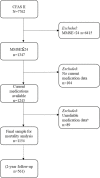How do potentially inappropriate medications and polypharmacy affect mortality in frail and non-frail cognitively impaired older adults? A cohort study
- PMID: 31092652
- PMCID: PMC6530304
- DOI: 10.1136/bmjopen-2018-026171
How do potentially inappropriate medications and polypharmacy affect mortality in frail and non-frail cognitively impaired older adults? A cohort study
Abstract
Objectives: To test whether the use of potentially inappropriate central nervous system acting medications, proton pump inhibitors (PPIs) or polypharmacy are associated with mortality in cognitively impaired older adults and whether frailer people are at greater risk of harm.
Setting: A cohort study nested within the Cognitive Function and Ageing Study II, a population representative cohort study of the older population in Cambridgeshire, Nottingham and Newcastle, UK.
Participants: A total of 1154 cognitively impaired participants, aged 65 years or older.
Exposures: Any use of antipsychotics, antidepressants, other anticholinergic medication, benzodiazepines or PPIs, polypharmacy (5-9) and hyperpolypharmacy (≥10 reported medications) were ascertained at baseline. Frailty was assessed using the Fried criteria.
Primary outcome: Mortality up to 8 years follow-up. HRs associated with potentially inappropriate medication (PIM), frailty and their interaction were estimated adjusting for covariates.
Results: Within the sample, 44% were taking one or more PIM. Apart from antipsychotics (adjusted HR=3.24, 95% CI 1.83 to 5.73), use of specific PIM was not associated with greater subsequent mortality. Polypharmacy (HR=1.17, 95% CI 0.95 to 1.45) and hyperpolypharmacy were associated with mortality (HR=1.60, 95% CI 1.16 to 2.22). Being frail (HR=1.90, 95% CI 1.32 to 2.72) or prefrail (HR=1.56, 95% CI 1.10 to 2.20) was associated with increased mortality. There was some evidence that the HR for polypharmacy on mortality was lower among frailer individuals, but the overall polypharmacy by frailty interaction was not statistically significant (p=0.102).
Conclusions: For those with cognitive impairment, greater concern should be afforded to the number of medications than the prescription of specific classes. Frailer individuals may have a lower relative risk of mortality associated with polypharmacy than less frail individuals.
Keywords: dementia; frailty; mortality; polypharmacy; potentially inappropriate medication.
© Author(s) (or their employer(s)) 2018. Re-use permitted under CC BY-NC. No commercial re-use. See rights and permissions. Published by BMJ.
Conflict of interest statement
Competing interests: None declared.
Figures


References
-
- Alzheimer’s Society. Dementia UK: update. 2014. https://www.alzheimers.org.uk/about-us/policy-and-influencing/dementia-u...
-
- All-Party Parliamentary Group. Dementia rarely travels alone, 2016. https://www.alzheimers.org.uk/appg
Publication types
MeSH terms
LinkOut - more resources
Full Text Sources
Medical
